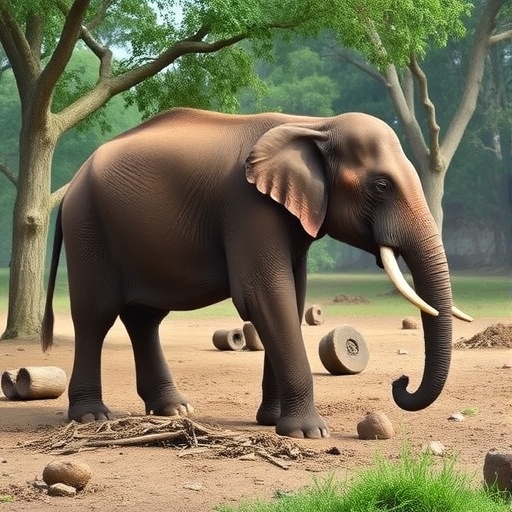
In a groundbreaking study that bridges the worlds of conservation and medicine, a team of researchers has explored the potential of Asian elephants as a reservoir of medicinal properties. This remarkable endeavor centers on the examination of methanolic extracts derived from elephant dung, which could pave the way for innovative treatments for colon cancer. The research exposes a fascinating interplay between traditional ecological knowledge and modern scientific inquiry, revealing how these majestic animals might contribute not only to biodiversity but also to human health.
Asian elephants, considered sacred in various cultures, are more than just symbols of strength and wisdom; they are also central to crucial ecological processes. By sampling and analyzing the dung of these elephants, the researchers have uncovered a rich array of bioactive compounds. These compounds are believed to possess significant therapeutic properties, particularly in the fight against colon cancer. This study signifies a departure from conventional sources of medicinal compounds, demonstrating nature’s vast potential for holistic health solutions.
A pivotal focus of this investigation is the antimicrobial properties inherent in pachyderm dung. The researchers conducted a series of bioassays to measure the efficacy of these extracts against a range of pathogenic microorganisms. Their findings revealed that methanolic extracts from elephant dung exhibit notable antimicrobial activity, which could be instrumental in the development of new antimicrobial agents. This discovery invites us to reconsider the untapped medicinal resources available in the natural world, emphasizing the need for further exploration in ethnopharmacology.
Moreover, the cytotoxic effects of these extracts have been meticulously studied. Colon cancer, among the leading causes of cancer-related deaths globally, necessitates innovative therapeutic approaches. The research team meticulously documented the growth inhibition of colon cancer cell lines upon exposure to elephant dung extracts. This provides promising insights into how these natural products might be harnessed to formulate novel anticancer therapies. Notably, the selectivity of these extracts towards cancerous cells raises important questions about their potential to minimize side effects associated with conventional cancer treatments.
The apoptotic induction capabilities of the extracts were also scrutinized. The mechanism of programmed cell death, or apoptosis, is crucial in cancer therapy as it allows for the targeted elimination of malignant cells. The researchers employed multiple assays to establish that the bioactive compounds within the extracts significantly triggered apoptotic pathways in the colon cancer cell lines tested. This remarkable finding positions the elephant dung extracts as potential candidates for advancing cancer treatments through more refined, targeted therapies.
While the findings are certainly intriguing, they also underscore the need for conservation and protection of the habitats in which these elephants reside. The study highlights how preserving biodiversity can yield unforeseen benefits for human health. In an era marked by the rapid loss of species and ecosystems, the connection between environmental integrity and the discovery of new medicines is compelling. Conservationists and researchers alike are reminded of the ethical implications of utilizing natural resources, advocating a sustainable approach that respects both ecological balance and the pursuit of medical advancements.
This study not only contributes to the scientific literature on natural products but also emphasizes the importance of integrating traditional knowledge within modern practices. Local communities often possess invaluable insights into the healing properties of various plants and animal byproducts. By collaborating with indigenous populations, researchers can unlock a treasure trove of knowledge that informs and enhances bioprospecting efforts.
As attention to the study grows within the scientific community, the potential implications of these findings could resonate far beyond the laboratory. The vision of utilizing renewable, naturally sourced materials in medicine mirrors a growing trend toward sustainable healthcare practices. There is an increasing demand for therapies that minimize environmental impact while maximizing patient welfare, making this research particularly relevant in today’s context.
Looking ahead, more exhaustive studies are required to fully characterize the components of elephant dung and the specific mechanisms by which they exert their therapeutic effects. Rigorous clinical trials must follow the preliminary in vitro findings to assess efficacy and safety in human populations. The road to developing a new cancer treatment based on elephant dung extracts may be long, but the journey has already begun, opening many doors to explore the intersection of wildlife conservation and human health.
Additionally, the implications of this research may encourage further investigations into other animal byproducts, broadening the scope of biomedicine. Many species in diverse ecosystems possibly harbor undiscovered bioactive compounds that could be pivotal in combating various diseases. The quest for new therapeutic agents is a race against time, with the looming threat of antibiotic resistance and the persistent burden of chronic diseases like cancer.
Awareness of such innovative research endeavors can foster a sense of responsibility towards wildlife conservation. As the narrative unfolds, it champions the notion that protecting biodiversity is not merely an ecological imperative but a frontier of medical innovation. As researchers and conservationists unite, the potential for synergy between these two domains could lead to a sustainable blueprint for the future of medicine.
As the story of using elephant dung in cancer research gains traction, it may well inspire similar initiatives globally. Other researchers can find motivation in this pioneering work, leading to an explosion of interest in ethnopharmacological studies. This can catalyze a renewed focus on documenting the medicinal uses of plants and animal products across diverse cultures, reinvigorating the age-old practice of traditional medicine.
In conclusion, this innovative research encapsulates the interconnectedness of our world’s systems. The sacred Asian elephant emerges not only as a cultural icon but also as a vital player in a burgeoning field of medicinal research. The potential to discover life-saving treatments from unexpected sources compels us all to value and protect our planet’s rich biodiversity, impelling future generations to walk the delicate line between humanity and nature. As this research finds its way into the larger conversation about global health, the legacy of the elephant may very well extend beyond symbolism, marking a pivotal moment in the quest for natural healing.
Subject of Research: Potential medicinal properties of Asian elephant dung in colon cancer treatment.
Article Title: Is sacred animal (Asian Elephant) can be a medicinal repository: a new approach for colon cancer treatment using the methanolic extracts of the dung samples and their valuation for antimicrobial, cytotoxic, and apoptotic actions.
Article References:
Rajashekara, S., Konyak, M.K., Sarala, R. et al. Is sacred animal (Asian Elephant) can be a medicinal repository: a new approach for colon cancer treatment using the methanolic extracts of the dung samples and their valuation for antimicrobial, cytotoxic, and apoptotic actions.
BMC Complement Med Ther 25, 295 (2025). https://doi.org/10.1186/s12906-025-05039-x
Image Credits: AI Generated
DOI: 10.1186/s12906-025-05039-x
Keywords: Asian elephants, medicinal properties, colon cancer, methanolic extracts, antimicrobial activity, cytotoxic effects, apoptosis, biodiversity, natural medicine, conservation.
Tags: antimicrobial properties of pachyderm dungAsian elephant dung medicinal propertiesAsian elephants and biodiversitybioactive compounds from elephant dungcolon cancer treatment researchconservation and health innovationecological knowledge in medicinegroundbreaking conservation studiesholistic health solutions from naturenature-based cancer therapiestherapeutic potential of animal wastetraditional medicine and modern science




